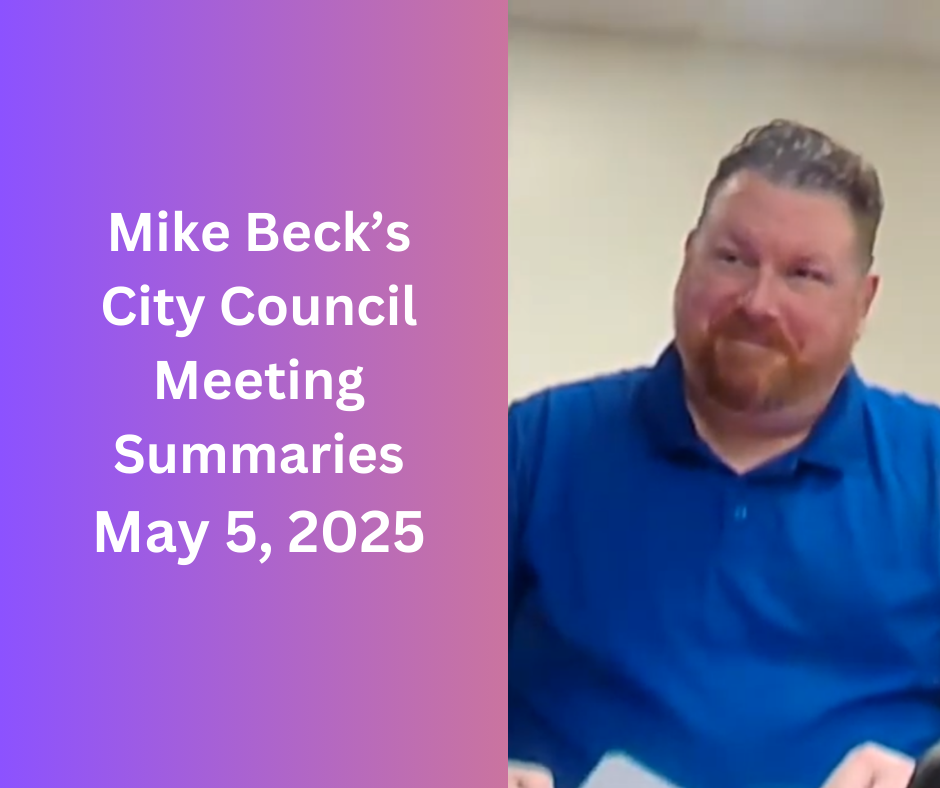
Disclaimer: The views I express here are my own and should NOT be construed as speaking for the City of Bangor or the City Council of Bangor.
Government Operations Committee
You can read the agenda for this meeting here.
1. Grant Appropriation:
- The committee discussed the acceptance and appropriation of a $75,000 grant. This grant, applied for in December of the previous year, will fund an energy audit for five city buildings (two schools, two golf course buildings, and the innovation center) and bicycle parking improvements at approximately 15 schools, five city parks, downtown locations, the Cross Center, and a secure bike storage facility at the parking garage.
- A motion was made and seconded to send this item back to the council for a second reading and appropriation of the grant money.
2. Bench Donations:
- Bangor Municipal Golf Course: The committee reviewed a request from the family of Bill Masters to donate a bench to the golf course in his memory. Discussions included the type of bench, cost (typically $750-$1000 for iron benches in city parks, but likely less for the golf course), and ongoing maintenance responsibility, which currently falls to the city. A policy is being drafted by the Park Recreation Harbor Advisory Committee to standardize bench donations. A motion to accept the bench donation was moved and seconded.
- Waterfront: The family of Elliana Campbell requested to donate a bench to the waterfront in her memory. The family is working with the city on pricing for appropriate benches, similar to existing black iron or granite styles on the waterfront. They hope to have the bench in place for a walk scheduled at the end of the month. A motion to accept this donation was also moved and seconded.
3. Naming of Talbot Trail:
- The committee discussed naming a section of trail, currently known as Trail 5, as “Talbot Trail.” This trail connects the end of Sylvan Road to Stillwater Avenue.
- The naming is in honor of civil rights leader and author Gerald Talbot, born and raised here in Bangor.
- I noted that the next step, according to the amended naming policy, is to refer the proposal to the advisory committee on racial equity, inclusion, and human rights, which was scheduled to meet the next day.
- I made a motion to refer the naming to the advisory committee and, barring no objection from them, to put it on the next council meeting agenda. It was seconded and approved.
4. Mansfield Stadium Dedicated Fund:
- The committee considered establishing a dedicated fund for Mansfield Stadium. Previously, proceeds from concessions, gate admissions, and donations were managed by the Little League under an agreement that has now expired. The city is transitioning to operate the stadium, and the dedicated fund would allow proceeds to be used for maintenance, materials, and capital expenditures for the facility. Similar dedicated funds are in place for the community garden and skate park.
- The finance director and the Parks and Recreation department would oversee the fund. The Little League will no longer be involved in managing the funds. The order establishing the fund will include language regarding tax-deductible donations. A motion was made to move this item forward.
5. Legislative Testimony for LD 104 and LD 1847 (Cannabis Policy):
- Director of Bangor Public Health and Community Services, presented testimony regarding cannabis policies. The testimony supports these LDs, which aim to protect medical cannabis users and youth. Key proposals include establishing maximum THC potency, forming a study group on youth cannabis use (funded by adult-use cannabis tax), and requiring blister packaging for edible gummies not stamped with a universal symbol to reduce accidental ingestion. Maine is currently the only state with a medical cannabis program that doesn’t mandate testing for harmful substances.
- The committee agreed to submit the testimony on an “ought to pass” basis, even though the public hearing had already occurred.
6. Public Health Update:
- Influenza: Influenza activity is waning for the season.
- HIV Cluster: As of the previous Thursday, there were 24 epidemiologically linked HIV cases over the last 19-20 months. Efforts are underway with community partners to address prevention, testing, treatment, and support, focusing on breaking down barriers for the complex lives of those impacted. Wabanaki Public Health and Wellness’s syringe service program moved to Hancock Street to improve access. Strategies include increasing testing (using “testing coupon cards”), improving access to care (including once-a-month injectable medication), and addressing basic needs like housing. Relationship building and reducing stigma are crucial.
- Wabanaki Center Collaboration: The Health Department is looking to co-locate some services at the Wabanaki Center on Hancock Street to create a “one-stop-shop” for services like testing, medical outreach, and connections to recovery and treatment, especially as warming shelters have closed. They are exploring funding options for rent and supplies. The Hancock Street location is more accessible than the Health Department’s current location near the airport. The Park Street syringe service program (SSP) site has closed.
- Emerging Infectious Diseases: The department is proactively addressing emerging issues like avian flu and measles (with cases in Vermont linked to international travel). They are collaborating with local healthcare systems to coordinate educational messages and vaccination efforts. Educational materials on mosquito-borne diseases are also being developed and translated. An infectious disease specialist is being hired to enhance preparedness.
- Tick-Borne Diseases: Efforts are underway to leverage existing educational materials from Maine CDC and promote tick testing and identification. Anaplasmosis was the most reported tick-borne disease last year, and many such diseases can have neurological effects if not treated quickly. They have applied for a grant to purchase tick spoons for distribution.
- Budget and Funding: The public health budget relies heavily on federal and state funds. They recently experienced a $16,000 cut in federal funding but were able to cover staff time with other funds.
- Strategic Planning: The department thanked those who completed their strategic planning survey and is now developing objectives and strategies.
7. Revisions to Chapter 99 of Disruptive Property Ordinance:
- City Solicitor presented proposed revisions to the disruptive property ordinance, which was initially passed in 2013 for residential properties. The revisions aim to address citizen concerns about nuisance properties.
- Proposed changes include:
- Adding two new “disruptive activities”:
- Police responding to a property and making an arrest for a crime or civil infraction caused by the owner, tenant, or guests.
- Intoxication on public ways within 300 feet of the property.
- Removing the “residential” limitation, making the ordinance applicable to other property types (e.g., commercial properties adjacent to residential ones).
- Removing the requirement for a building to be on the property.
- Adding two new “disruptive activities”:
- The existing ordinance’s progressive notice and action provisions based on the number of disruptive activities within certain timeframes would remain. The police chief confirms disruptive activities.
- By removing the word “residential”, I questioned whether the noise ordinance would suddenly start applying to Waterfront Concerts. It was clarified that properties with individual use agreements with the city (like the Waterfront Concerts venue) would be subject to the terms of those agreements regarding issues like noise.
- It was further clarified that disruptive instances are tied to the property, even if problematic tenants are evicted.
- The ordinance is often used as a tool to encourage voluntary compliance from property owners.
- A motion was made and seconded to move the proposed revisions forward for a first reading on Monday night. Public comment is typically taken at the second reading.
Finance Committee
You can read the agenda for this meeting here.
1. Tree Cutting and Stump Grinding Bid:
- Five bids were received for tree cutting and four for stump grinding.
- Decision: The committee recommended splitting the bid. Gunnett Tree and Lawn Care was recommended for tree cutting (as the third-lowest bidder, due to issues with the lowest and second-lowest bidders). Maine Tree Service, the current provider and low bidder, was recommended for stump grinding.
- The combined cost is approximately $57,000 a year, covered by the public works operational budget.
- A motion for approval was made and seconded.
2. Electric Vehicle Purchase:
- The city received a $35,000 grant for an electric vehicle for staff use.
- Five bids were received.
- Decision: The committee recommended purchasing the Chevy Equinox, despite it being the highest-priced bid. This was due to its superior mileage per charge and eligibility for a $7,500 federal credit, bringing the net cost to the city to $3,489, to be paid from the climate action fund.
- The Hyundai, though potentially free after the grant, was ruled out due to a long waiting period, lesser mileage, and longer charging times.
- Concerns were raised about why mileage per charge wasn’t a primary criterion in the initial bid request. It was clarified that a minimum of 250 miles was stated, with 300 miles preferred.
- A motion for approval was made and seconded.
3. Uniforms for Public Works and Police Services:
- Two bids were received: Cintas and Unifirst (the current provider).
- The staff recommended Unifirst, the low bidder.
- The estimated annual cost is $49,000, with the city paying 75% (around $36,000) and employees paying 25%. Director stated this is within the operating budget.
- A motion for approval was made and seconded.
4. Security Access Control System at the Airport:
- Five bids were received.
- Staff recommended Johnson Controls (the second-lowest bidder) at $300,000. The lowest bidder, TEC Solutions, did not provide all required documentation and, crucially, did not bid to install the equipment.
- The project is within the approved $500,000 budget.
- This item will go to the full council for final approval. Councilor Pelletier noted a conflict of interest with Johnson Controls and will recuse herself.
- A motion for approval was made and seconded.
5. Hybrid ADA Van for the Community Connector:
- The city is required to provide ADA paratransit services and needs additional vehicles due to increased demand.
- Maine DOT offered $467,327 in discretionary funding in 2024, part of which was for purchasing two electric or hybrid vehicles. This van is one of them and is 100% funded by Maine DOT.
- To meet federal regulations for purchases under $250,000, a good faith effort was made to obtain quotes. Five organizations were contacted; two responded, but only one (Mobility Works) had a suitable vehicle.
- Staff recommended purchasing a new 2025 Toyota hybrid ADA-compliant van from Mobility Works for $85,000. The price was deemed reasonable.
- The van is available immediately and would be in service within a couple of weeks if approved.
- A motion for approval was made and seconded.
6. Paid Family Medical Leave:
- Starting January 2025, a new state law requires withholding 1% of employees’ gross wages to fund a state-level paid family medical leave pool. Employees can use the program in May 2026.
- Employers can opt for a private plan. The city’s insurance consultant explored this, contacting five state-preapproved providers.
- Staff recommended a private plan with The Standard at a rate of 0.885% (compared to the state’s 1%).
- If an application to the state is approved by the end of the month, the city could stop withholdings (currently covered by the city) until May 2026, resulting in an estimated saving of nearly $850,000 over three years. The first quarter’s payment to the state is non-refundable.
- The committee discussed potential administrative burdens and believes they can be managed in-house.
- This item will go to the full council next week.
- A motion to make the application and move forward was made and seconded.
7. Update on Auditors:
- An update was requested regarding the auditors.
- It was reported that the audit is being worked on, and more details on its progress are expected soon. No new issues were reported.
8. Executive Session:
- The committee moved to an executive session for the disposition of real property.
- Following the executive session, a motion was made and seconded to accept the staff recommendation, which will also go to the full council next week.
Business and Economic Development
You can read the meeting’s agenda here. I am not a voting member of this committee, but was in attendance.
Land Development Code Modifications
The committee discussed and advanced proposed changes to the city’s land development code. One set of proposals focused on rules for existing mobile home parks established before 1971. The primary aim is to prevent the loss of affordable housing that could result from redevelopment under current, stricter regulations which might necessitate the removal of existing homes. Key proposed changes include:
- Eliminating the requirement for parks to prove financial hardship to qualify for reduced standards.
- Decreasing the minimum lot area from 4,000 to 2,500 square feet.
- Maintaining existing setbacks between homes and lot lines, as well as standards for lot coverage and impervious surface area.
- Retaining a 20,000 square foot minimum for lots with individual septic systems.
- Requiring a site evaluator’s report for shared septic systems and ensuring shared water supplies meet current standards.
- Clarifying language related to roads and landscaping.
A motion to send these changes to the council was approved.
Additionally, a change to the temporary sales ordinance was proposed. The current ordinance restricts the number of food and merchandise vendors (five per lot in the waterfront development district and ten in the entire district) and limits total vendor square footage to 1,000 square feet, which has created challenges for waterfront vendors. The proposal suggests removing these specific limits and instead relying on the existing waterfront policy, partly to facilitate the introduction of more food trucks to the area. This proposal was also moved to the full council.
Community Development Block Grant Program & Action Plan
Key Points of the CDBG Presentation:
- Annual Action Plan & Public Comment: The memo submitted concerns the annual action plan, and the public comment period starts today. The plan is available on the CDBG page of the website. (Click Here)
- Relation to Consolidated Plan: The annual action plan represents 1/5th of the actionable strategies in the consolidated plan, which will be presented later in the summer or early fall.
- Needs Assessment & Funding: The 2024 needs assessment was updated and used to draft the 2025 annual action plan. It’s based on the assumption that funding will remain the same as last year (approximately $821,000), following a federal continuing resolution. An additional $250,000 in program income for the residential program is also budgeted.
- Public Engagement Findings: Public engagement confirmed that affordable housing, healthcare, and homelessness are salient community issues. Projects the community wants to see continued include affordable housing, economic opportunities, and support for vulnerable populations.
- Engagement methods included five neighborhood meetings and one large community-wide meeting. Ranked exercises were used to identify key community issues. More detailed data will be in the consolidated plan.
- Available Resources & Allocations: The city expects to receive between $815,000 to $820,000 by the end of June. The funding allocations in the memo include these new funds, as well as funds on hand from ongoing projects. Some projects within these high-level budget buckets are not yet identified but are typical for the city.
- Next Steps: The plan will be available for public comment for 30 days. During this period, there will be a formal hearing at a future Business & Economic Development (BED) committee, followed by a similar public comment period and approval at the council level.
Council Questions and Discussion:
- Councilor Fish on Childcare Access:
- Councilor Fish noted that only one inquiry or dot in the breakout session concerned childcare access and questions if this means a large group of people is not being reached.
- The Community Development Officer (CDO) explained it could be due to the data collection method (participants rated their top four issues with four dots), or that childcare wasn’t a top-four issue for those present, despite efforts to make meetings accessible to families.
- Councilor Leonard on Parks & Playgrounds Funding:
- Councilor Leonard questioned the allocation of $233,000 for parks and playgrounds when affordable housing, homelessness, and mental health are the top three citizen priorities. He struggled to see how this spending directly addresses those primary concerns and suggests the money could be better used for housing or mental health services.
- CDO responded that while parks and playground improvements don’t directly address those top needs, they can contribute to overall neighborhood improvements, potentially impacting housing desirability and benefiting existing residents.
- CDO also points out that funding for mental health services falls under the public service cap imposed by HUD (Housing and Urban Development). The current budget for homeless and public services is near this cap.
- Economic Development Director added that CDBG has a 15% cap for services, with the intent being investment in low-to-moderate income neighborhoods. The current public services budget of about $128,000 is within this cap. This money funds the Bangor Community Action Team and non-profits.
- Me on Parks & Playgrounds Funding (continued):
- I echoed concerns about parks and playgrounds being the second-highest expense and questioned how the $233,000 figure was reached, noting it doesn’t seem to align with the Parks and Rec master plan. I stated my belief that CDBG money should be for things not typically in the budget, like down payment assistance.
- Management explained that historically, a decent portion of CDBG funds has gone to public infrastructure. In recent years, instead of playground equipment (last done 15-18 years ago with CDBG funds), it has been used for street and sidewalk paving in low-to-moderate income census tract districts. They are now returning to Parks and Rec.
- The Parks and Rec Director clarifies the $233,000 is intended for Williams Park (corner of Hancock and Newbury Streets). This includes replacing the current 5-12 year old structure (from around 2009) and adding a dedicated “tot lot” for 2-5 year olds, which is currently lacking in most parks. All swings would also be replaced. An estimate was provided by a playground installer, and the project will go out to competitive bid. He notes the proximity of family housing to Williams Park.
- I followed up, questioning why a playground replacement for Williams Park wasn’t mentioned as a need in the 2021 Parks and Rec master plan and if it has deteriorated significantly in the last three years. No answer provided.
Foreign Trade Zone (FTZ) Explained
Clarifications were provided regarding the Foreign Trade Zone (FTZ). The City of Bangor holds the grant for FTZ 58, overseeing its operation across a five-county region. Key distinctions between an FTZ and a bonded warehouse were outlined: FTZs offer greater flexibility, permitting activities such as storage, manufacturing, testing, and assembly, whereas bonded warehouses are generally limited to storage. Importantly, under Bangor’s alternative site framework, businesses within the designated counties can apply to activate FTZ status at their own facilities, not necessarily requiring a centralized warehouse. Operating within an FTZ can lead to reduced, deferred, or eliminated duties on goods.
The committee also learned the difference between tariffs (tax categories on imports) and duties (specific amounts charged). While U.S. Customs and Border Protection (CBP) regulates bonded warehouses, the City of Bangor manages the FTZ program in compliance with CBP regulations. Businesses utilizing the FTZ are responsible for their import/export paperwork, with the city providing facilitation.
Central Kitchen Project Update
The committee received an update on the Central Kitchen project. Following the discovery that redeveloping the existing building at 50 Cleveland Street would be $1.5 million over budget, the committee had previously approved the purchase of a prefabricated metal building.
An exploration into potentially relocating the kitchen closer to the airport was undertaken. However, after evaluating factors such as travel distance, deployment costs, future growth potential, delivery timelines, and operational impacts, it was concluded that 50 Cleveland Street remains the optimal location. The site’s proximity to the Maine Aviation (MA) facility was also seen as advantageous, offering a built-in customer base and potential learning opportunities for students. The committee was asked to affirm 50 Cleveland Street as the chosen site for the new prefabricated building.
Executive Session
Following the public meeting, the committee moved into an executive session to discuss matters related to the disposition of real property or economic development. I left before the executive session took place.





